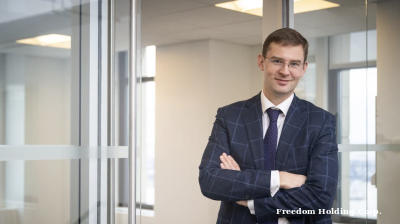As Uzbekistan continues its transition toward a more open and market-driven economy, there is progress in attracting foreign direct investment (FDI) and improving the overall business climate.
bne IntelliNews had a chance to sit down with Aziz Gafurov, head of the secretariat of the country's Foreign Investment Council (FIC), to discuss how Uzbekistan’s investment landscape is changing.
Gafurov outlined current investment trends, key government reforms and how the FIC is helping bridge the gap between investor expectations and policy implementation.
Amid the continuing reform of Uzbekistan's investment environment, in 2024 the country attracted $34.6bn in investment, including $11.9bn in FDI.
Some 242 investment projects were launched, generating over 32,700 jobs. Gafurov said that members of the FIC played a crucial role in this success.
In response to investor feedback, the government has introduced a series of reforms focused on simplification of regulatory activities, strengthening investor protections and aligning Uzbekistan’s legal and business framework with international standards.
Key reforms include the streamlining of tax procedures, a reduction in the value-added tax (VAT) rate to 12% and the simplification of business registration. The government is also advancing a strategy to reduce state ownership in the economy.
A notable step is a partnership with global asset manager Franklin Templeton to list $1.7bn worth of state assets on international markets by 2026.
In December 2024, the Law on Special Economic Zones (SEZs) was amended to dissolve administrative councils and transfer their responsibilities to SEZ directorates.
These directorates now have the authority to independently approve investment projects, allocate land and oversee infrastructure development—effectively reducing bureaucracy and expediting decision-making processes.
Looking ahead, the government plans to introduce additional legal and institutional changes to deepen investor engagement.
Foreign investor interest is growing rapidly across a range of sectors, reflecting the country’s reform efforts and strategic focus on diversification.
Based on the activities of FIC members, Gafurov highlighted several high-potential sectors: renewable energy, information technology (IT) and the digital economy, e-commerce, tourism, transport and financial services.
In renewable energy, Uzbekistan is becoming a regional leader, drawing investment from major international firms including ACWA Power, Masdar, Total Energies, Voltalia and China Energy.
These investments are part of the government’s broader objective to derive 40% of its energy from renewable sources by 2030.
In the IT and digital economy sector, the government has launched initiatives such as IT Park Uzbekistan and the “Digital Uzbekistan 2030” strategy.
The recently established International Digital Technology Centre offers a favourable regulatory environment to attract global IT and business process outsourcing (BPO) companies. The goal is to increase IT service exports to $5bn and generate over 300,000 jobs in the sector.
Tourism is also experiencing significant growth. The government is modernising airports, promoting cultural heritage sites and expanding tourism offerings to include ecotourism and pilgrimage tourism.
In 2024, Uzbekistan welcomed approximately 8.2mn foreign tourists, a substantial increase from 6.6mn in 2023.
In the transport sector, Uzbekistan’s strategic location in Central Asia is being leveraged through major infrastructure investments. The 573-kilometre (356-mile) Uzbekistan–Afghanistan–Pakistan Railway is expected to reduce cargo delivery times from 35 to five days and cut costs by at least 40%. The timescale for its delivery, however, is still very unclear.
Additionally, the China–Kyrgyzstan–Uzbekistan (CKU) railway, supported by a $255mn investment from Uzbekistan, is designed to streamline freight movement between Asia and Europe, elevating regional connectivity.
There is also rising investor interest in service industries, particularly digital banking and retail. This trend is driven by the country's young and tech-savvy population.
Gafurov highlighted the positive social impact of many investors, noting that several have launched educational programmes aimed at upskilling the local workforce and developing sector-specific talent.
The FIC plays a role in bridging the gap between investor expectations and government regulations. Serving as a direct communication platform, the FIC facilitates dialogue between foreign investors and relevant government agencies.
“Our role is to act as an open platform for addressing key challenges in implementing investment projects in Uzbekistan,” Gafurov said.
The Council’s working groups, interim sessions and plenary sessions allow for in-depth discussions, stakeholder engagement and consensus-building. These platforms ensure that proposed reforms are well-informed, comprehensive and aligned with both investor needs and government priorities.
In 2024, the Council was relaunched and its working groups reactivated. There are currently four active groups focused on Finance & Banking, IT and Digitalisation, Energy, and Education.
These working groups—composed of Council investors—identify urgent reform areas and develop specific regulatory proposals. Their goal is to produce evidence-based, ready-to-implement recommendations that help accelerate reforms and improve the business environment.
Despite significant progress, foreign investors in Uzbekistan still face challenges.
“In today’s volatile global economy, uncertainty remains the biggest challenge for investors—both in Uzbekistan and globally,” Gafurov acknowledged.
Specific issues include complex interactions with government authorities, infrastructure limitations, regulatory ambiguity and complications related to tax administration.
To address these difficulties, the FIC is facilitating improved communication between investors and government agencies. One initiative is the development of a single-window platform to simplify administrative procedures and reduce bureaucratic delays.
Another critical issue is the shortage of highly skilled professionals, particularly in fast-growing and digitising sectors.
To address this, the Council has established a dedicated working group on talent development, aimed at building local capacity and fostering a more competitive workforce.
When asked which reforms have had the greatest impact on attracting investment, Gafurov pointed to regulatory predictability and the stability of business conditions. Investors also value transparent legal frameworks and access to globally recognised financial instruments. The FIC says it continues to work closely with Council members to advance reforms in these areas.
Gafurov emphasised that the FIC plays a central role in ensuring that investor feedback shapes government policy.
“The Council regularly discusses key draft regulations and programmes, collects feedback from stakeholders, and communicates it to government agencies,” he said. This investor-centric approach is now a core principle of Uzbekistan’s investment strategy, and the FIC says it is committed to ensuring that investor voices remain central to the reform process.
With his extensive experience in risk management and corporate governance, Gafurov offered a measured assessment of investment risks in Uzbekistan.
“The risk is high—as in many emerging markets—but manageable,” he said.
Uzbekistan’s risk profile has improved significantly due to macroeconomic stability, legal reforms and strengthened regulation. Nonetheless, risks remain in areas such as policy predictability, contract enforcement and administrative burdens at the regional level.
The FIC helps mitigate these risks by offering structured feedback channels, early engagement on proposed regulations, and promoting alignment with global standards of transparency and governance. Gafurov noted that while real progress has been made, continuous dialogue and institutional reform are essential for sustaining investor confidence.
Drawing on his regional and international experience, Gafurov also highlighted best practices that Uzbekistan could adopt from Central Asia and the European Union.
These include the implementation of formal regulatory impact assessments (RIAs), expansion of digital investor services and the strengthening of public-private dialogue mechanisms. Gafurov also pointed to the growing importance of environmental, social and governance (ESG) standards.
“ESG integration, modelled after the EU Green Deal framework, could attract climate-conscious capital,” he said.
Additionally, he noted that global investors are increasingly drawn to purpose-driven projects in culture, education, and creative industries—areas where Uzbekistan holds significant potential.
“We are already testing some of these models within the FIC secretariat and see real value in aligning our approach with proven global standards,” Gafurov concluded. “This will help reinforce Uzbekistan’s long-term economic strategy and ensure that we continue building a resilient, inclusive and competitive investment landscape.”
Features

INTERVIEW: Former US official on America's lost authority as Global South acts on Gaza
As Gaza's death toll passes 61,000, nations meeting in Bogotá pledge concrete measures to halt arms flows to Israel. Ex-US official Annelle Sheline, who resigned over Washington's Gaza policy, calls it a turning point for the Global South.

South Korea’s tax reform triggers investor concerns
What was once a buoyant rally under President Lee Jae Myung’s pledge to lift the Kospi to 5,000 points is now shadowed by concerns over the economic implications of sweeping tax changes.

A year on from Sheikh Hasina’s flight into exile, Bangladesh waits for stability
A year and a day after Sheikh Hasina’s dramatic departure, Bangladesh remains – still - in the throes of a fraught transition. The interim government, though promising, is yet to deliver meaningful reform.

UN accused of enabling Hamas through Gaza aid mismanagement
There are also persistent claims that Hamas is systematically looting the aid that does make it into Gaza. Military officials estimate 80% of all assistance is intercepted either by Hamas members, its affiliates or civilians acting under its control.




